Appendix C. A message-passing framework and complete ATM example
Back in chapter 4, I presented an example of sending messages between threads using a message-passing framework, using a simple implementation of the code in an ATM as an example. What follows is the complete code for this example, including the message-passing framework.
Listing C.1 shows the message queue. It stores a list of messages as pointers to a base class; the specific message type is handled with a template class derived from that base class. Pushing an entry constructs an appropriate instance of the wrapper class and stores a pointer to it; popping an entry returns that pointer. Because the message_base class doesn’t have any member functions, the popping thread will need to cast the pointer to a suitable wrapped_message<T> pointer before it can access the stored message.
Listing C.1. A simple message queue
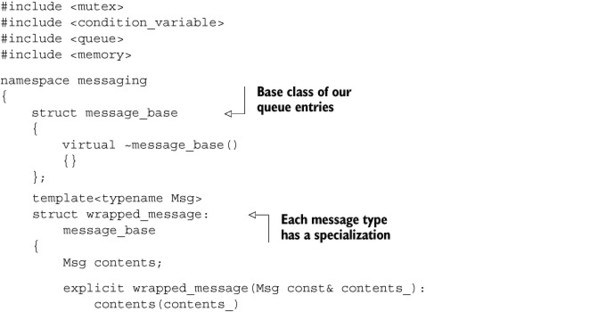
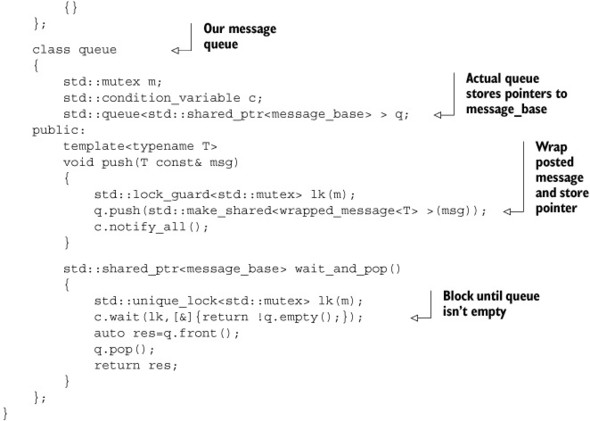
Sending messages is handled through an instance of the sender class shown in listing C.2. This is just a thin wrapper around a message queue that only allows messages to be pushed. Copying instances of sender just copies the pointer to the queue rather than the queue itself.
Listing C.2. The sender class
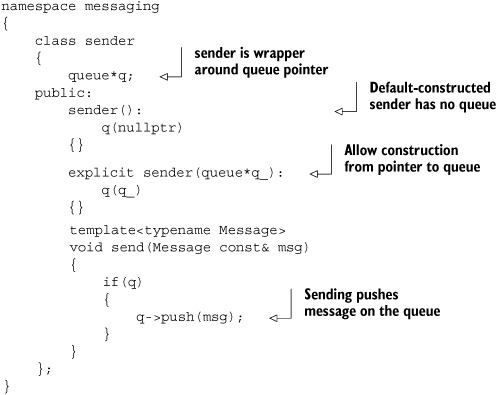
Receiving messages is a bit more complicated. Not only do you have to wait for a message from the queue, but you also have to check to see if the type matches any of the message types being waited on and call the appropriate handler function. This all starts with the receiver class shown in the following listing.
Listing C.3. The receiver class
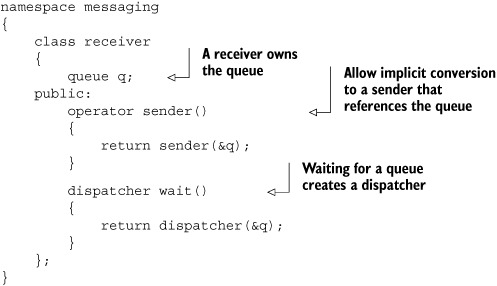
Whereas a sender just references a message queue, a receiver owns it. You can obtain a sender that references the queue by using the implicit conversion. The complexity of doing the message dispatch starts with a call to wait(). This creates a dispatcher object that references the queue from the receiver. The dispatcher class is shown in the next listing; as you can see, the work is done in the destructor. In this case, that work consists of waiting for a message and dispatching it.
Listing C.4. The dispatcher class

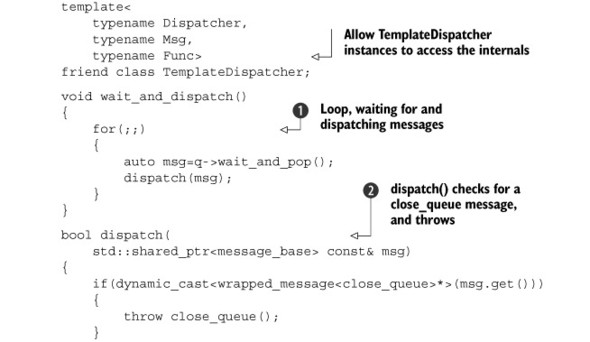

The dispatcher instance that’s returned from wait() will be destroyed immediately, because it’s a temporary, and as mentioned, the destructor does the work. The destructor calls
wait_and_dispatch(), which is a loop ![]() that waits for a message and passes it to dispatch(). dispatch() itself
that waits for a message and passes it to dispatch(). dispatch() itself ![]() is rather simple; it checks whether the message is a close_queue message and throws an exception if it is; otherwise, it returns false to indicate that the message was unhandled. This close_queue exception is why the destructor is marked noexcept(false); without this annotation the default exception specification for the destructor would be noexcept(true)
is rather simple; it checks whether the message is a close_queue message and throws an exception if it is; otherwise, it returns false to indicate that the message was unhandled. This close_queue exception is why the destructor is marked noexcept(false); without this annotation the default exception specification for the destructor would be noexcept(true) ![]() , indicating that no exceptions can be thrown, and the close_queue exception would thus terminate the program.
, indicating that no exceptions can be thrown, and the close_queue exception would thus terminate the program.
It’s not often that you’re going to call wait() on its own, though; most of the time you’ll be wanting to handle a message. This is where the handle() member function ![]() comes in. It’s a template, and the message type isn’t deducible, so you must specify which message type to handle and pass
in a function (or callable object) to handle it. handle() itself passes the queue, the current dispatcher object, and the handler function to a new instance of the TemplateDispatcher class template, to handle messages of the specified type. This is shown in listing C.5. This is why you test the chained value in the destructor before waiting for messages; not only does it prevent moved-from objects waiting for messages, but
it also allows you to transfer the responsibility of waiting to your new TemplateDispatcher instance.
comes in. It’s a template, and the message type isn’t deducible, so you must specify which message type to handle and pass
in a function (or callable object) to handle it. handle() itself passes the queue, the current dispatcher object, and the handler function to a new instance of the TemplateDispatcher class template, to handle messages of the specified type. This is shown in listing C.5. This is why you test the chained value in the destructor before waiting for messages; not only does it prevent moved-from objects waiting for messages, but
it also allows you to transfer the responsibility of waiting to your new TemplateDispatcher instance.
Listing C.5. The TemplateDispatcher class template

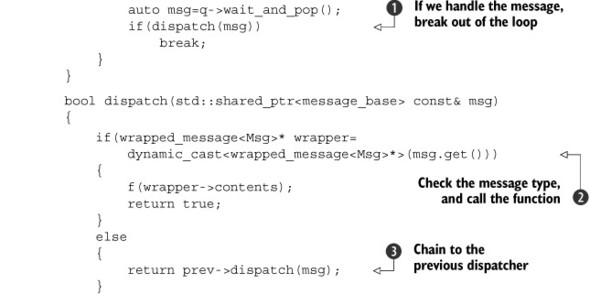
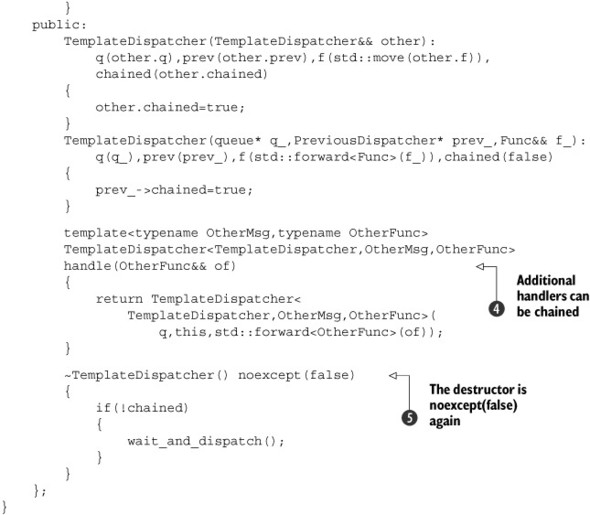
The TemplateDispatcher<> class template is modeled on the dispatcher class and is almost identical. In particular, the destructor still calls wait_and_dispatch() to wait for a message.
Since you don’t throw exceptions if you handle the message, you now need to check whether you did handle the message in your
message loop ![]() . Your message processing stops when you’ve successfully handled a message, so that you can wait for a different set of messages
next time. If you do get a match for the specified message type, the supplied function is called
. Your message processing stops when you’ve successfully handled a message, so that you can wait for a different set of messages
next time. If you do get a match for the specified message type, the supplied function is called ![]() rather than throwing an exception (although the handler function may throw an exception itself). If you don’t get a match,
you chain to the previous dispatcher
rather than throwing an exception (although the handler function may throw an exception itself). If you don’t get a match,
you chain to the previous dispatcher ![]() . In the first instance, this will be a dispatcher, but if you chain calls to handle()
. In the first instance, this will be a dispatcher, but if you chain calls to handle() ![]() to allow multiple types of messages to be handled, this may be a prior instantiation of TemplateDispatcher<>, which will in turn chain to the previous handler if the message doesn’t match. Because any of the handlers might throw an
exception (including the dispatcher’s default handler for close_queue messages), the destructor must once again be declared noexcept(false)
to allow multiple types of messages to be handled, this may be a prior instantiation of TemplateDispatcher<>, which will in turn chain to the previous handler if the message doesn’t match. Because any of the handlers might throw an
exception (including the dispatcher’s default handler for close_queue messages), the destructor must once again be declared noexcept(false) ![]() .
.
This simple framework allows you to push any type of message on the queue and then selectively match against messages you can handle on the receiving end. It also allows you to pass around a reference to the queue for pushing messages on, while keeping the receiving end private.
To complete the example from chapter 4, the messages are given in listing C.6, the various state machines in listings C.7, C.8, and C.9, and the driving code in listing C.10.
Listing C.6. ATM messages
struct withdraw
{
std::string account;
unsigned amount;
mutable messaging::sender atm_queue;
withdraw(std::string const& account_,
unsigned amount_,
messaging::sender atm_queue_):
account(account_),amount(amount_),
atm_queue(atm_queue_)
{}
};
struct withdraw_ok
{};
struct withdraw_denied
{};
struct cancel_withdrawal
{
std::string account;
unsigned amount;
cancel_withdrawal(std::string const& account_,
unsigned amount_):
account(account_),amount(amount_)
{}
};
struct withdrawal_processed
{
std::string account;
unsigned amount;
withdrawal_processed(std::string const& account_,
unsigned amount_):
account(account_),amount(amount_)
{}
};
struct card_inserted
{
std::string account;
explicit card_inserted(std::string const& account_):
account(account_)
{}
};
struct digit_pressed
{
char digit;
explicit digit_pressed(char digit_):
digit(digit_)
{}
};
struct clear_last_pressed
{};
struct eject_card
{};
struct withdraw_pressed
{
unsigned amount;
explicit withdraw_pressed(unsigned amount_):
amount(amount_)
{}
};
struct cancel_pressed
{};
struct issue_money
{
unsigned amount;
issue_money(unsigned amount_):
amount(amount_)
{}
};
struct verify_pin
{
std::string account;
std::string pin;
mutable messaging::sender atm_queue;
verify_pin(std::string const& account_,std::string const& pin_,
messaging::sender atm_queue_):
account(account_),pin(pin_),atm_queue(atm_queue_)
{}
};
struct pin_verified
{};
struct pin_incorrect
{};
struct display_enter_pin
{};
struct display_enter_card
{};
struct display_insufficient_funds
{};
struct display_withdrawal_cancelled
{};
struct display_pin_incorrect_message
{};
struct display_withdrawal_options
{};
struct get_balance
{
std::string account;
mutable messaging::sender atm_queue;
get_balance(std::string const& account_,messaging::sender atm_queue_):
account(account_),atm_queue(atm_queue_)
{}
};
struct balance
{
unsigned amount;
explicit balance(unsigned amount_):
amount(amount_)
{}
};
struct display_balance
{
unsigned amount;
explicit display_balance(unsigned amount_):
amount(amount_)
{}
};
struct balance_pressed
{};
Listing C.7. The ATM state machine
class atm
{
messaging::receiver incoming;
messaging::sender bank;
messaging::sender interface_hardware;
void (atm::*state)();
std::string account;
unsigned withdrawal_amount;
std::string pin;
void process_withdrawal()
{
incoming.wait()
.handle<withdraw_ok>(
[&](withdraw_ok const& msg)
{
interface_hardware.send(
issue_money(withdrawal_amount));
bank.send(
withdrawal_processed(account,withdrawal_amount));
state=&atm::done_processing;
}
)
.handle<withdraw_denied>(
[&](withdraw_denied const& msg)
{
interface_hardware.send(display_insufficient_funds());
state=&atm::done_processing;
}
)
.handle<cancel_pressed>(
[&](cancel_pressed const& msg)
{
bank.send(
cancel_withdrawal(account,withdrawal_amount));
interface_hardware.send(
display_withdrawal_cancelled());
state=&atm::done_processing;
}
);
}
void process_balance()
{
incoming.wait()
.handle<balance>(
[&](balance const& msg)
{
interface_hardware.send(display_balance(msg.amount));
state=&atm::wait_for_action;
}
)
.handle<cancel_pressed>(
[&](cancel_pressed const& msg)
{
state=&atm::done_processing;
}
);
}
void wait_for_action()
{
interface_hardware.send(display_withdrawal_options());
incoming.wait()
.handle<withdraw_pressed>(
[&](withdraw_pressed const& msg)
{
withdrawal_amount=msg.amount;
bank.send(withdraw(account,msg.amount,incoming));
state=&atm::process_withdrawal;
}
)
.handle<balance_pressed>(
[&](balance_pressed const& msg)
{
bank.send(get_balance(account,incoming));
state=&atm::process_balance;
}
)
.handle<cancel_pressed>(
[&](cancel_pressed const& msg)
{
state=&atm::done_processing;
}
);
}
void verifying_pin()
{
incoming.wait()
.handle<pin_verified>(
[&](pin_verified const& msg)
{
state=&atm::wait_for_action;
}
)
.handle<pin_incorrect>(
[&](pin_incorrect const& msg)
{
interface_hardware.send(
display_pin_incorrect_message());
state=&atm::done_processing;
}
)
.handle<cancel_pressed>(
[&](cancel_pressed const& msg)
{
state=&atm::done_processing;
}
);
}
void getting_pin()
{
incoming.wait()
.handle<digit_pressed>(
[&](digit_pressed const& msg)
{
unsigned const pin_length=4;
pin+=msg.digit;
if(pin.length()==pin_length)
{
bank.send(verify_pin(account,pin,incoming));
state=&atm::verifying_pin;
}
}
)
.handle<clear_last_pressed>(
[&](clear_last_pressed const& msg)
{
if(!pin.empty())
{
pin.pop_back();
}
}
)
.handle<cancel_pressed>(
[&](cancel_pressed const& msg)
{
state=&atm::done_processing;
}
);
}
void waiting_for_card()
{
interface_hardware.send(display_enter_card());
incoming.wait()
.handle<card_inserted>(
[&](card_inserted const& msg)
{
account=msg.account;
pin="";
interface_hardware.send(display_enter_pin());
state=&atm::getting_pin;
}
);
}
void done_processing()
{
interface_hardware.send(eject_card());
state=&atm::waiting_for_card;
}
atm(atm const&)=delete;
atm& operator=(atm const&)=delete;
public:
atm(messaging::sender bank_,
messaging::sender interface_hardware_):
bank(bank_),interface_hardware(interface_hardware_)
{}
void done()
{
get_sender().send(messaging::close_queue());
}
void run()
{
state=&atm::waiting_for_card;
try
{
for(;;)
{
(this->*state)();
}
}
catch(messaging::close_queue const&)
{
}
}
messaging::sender get_sender()
{
return incoming;
}
};
Listing C.8. The bank state machine
class bank_machine
{
messaging::receiver incoming;
unsigned balance;
public:
bank_machine():
balance(199)
{}
void done()
{
get_sender().send(messaging::close_queue());
}
void run()
{
try
{
for(;;)
{
incoming.wait()
.handle<verify_pin>(
[&](verify_pin const& msg)
{
if(msg.pin=="1937")
{
msg.atm_queue.send(pin_verified());
}
else
{
msg.atm_queue.send(pin_incorrect());
}
}
)
.handle<withdraw>(
[&](withdraw const& msg)
{
if(balance>=msg.amount)
{
msg.atm_queue.send(withdraw_ok());
balance-=msg.amount;
}
else
{
msg.atm_queue.send(withdraw_denied());
}
}
)
.handle<get_balance>(
[&](get_balance const& msg)
{
msg.atm_queue.send(::balance(balance));
}
)
.handle<withdrawal_processed>(
[&](withdrawal_processed const& msg)
{
}
)
.handle<cancel_withdrawal>(
[&](cancel_withdrawal const& msg)
{
}
);
}
}
catch(messaging::close_queue const&)
{
}
}
messaging::sender get_sender()
{
return incoming;
}
};
Listing C.9. The user-interface state machine
class interface_machine
{
messaging::receiver incoming;
public:
void done()
{
get_sender().send(messaging::close_queue());
}
void run()
{
try
{
for(;;)
{
incoming.wait()
.handle<issue_money>(
[&](issue_money const& msg)
{
{
std::lock_guard<std::mutex> lk(iom);
std::cout<<"Issuing "
<<msg.amount<<std::endl;
}
}
)
.handle<display_insufficient_funds>(
[&](display_insufficient_funds const& msg)
{
{
std::lock_guard<std::mutex> lk(iom);
std::cout<<"Insufficient funds"<<std::endl;
}
}
)
.handle<display_enter_pin>(
[&](display_enter_pin const& msg)
{
{
std::lock_guard<std::mutex> lk(iom);
std::cout
<<"Please enter your PIN (0-9)"
<<std::endl;
}
}
)
.handle<display_enter_card>(
[&](display_enter_card const& msg)
{
{
std::lock_guard<std::mutex> lk(iom);
std::cout<<"Please enter your card (I)"
<<std::endl;
}
}
)
.handle<display_balance>(
[&](display_balance const& msg)
{
{
std::lock_guard<std::mutex> lk(iom);
std::cout
<<"The balance of your account is "
<<msg.amount<<std::endl;
}
}
)
.handle<display_withdrawal_options>(
[&](display_withdrawal_options const& msg)
{
{
std::lock_guard<std::mutex> lk(iom);
std::cout<<"Withdraw 50? (w)"<<std::endl;
std::cout<<"Display Balance? (b)"
<<std::endl;
std::cout<<"Cancel? (c)"<<std::endl;
}
}
)
.handle<display_withdrawal_cancelled>(
[&](display_withdrawal_cancelled const& msg)
{
{
std::lock_guard<std::mutex> lk(iom);
std::cout<<"Withdrawal cancelled"
<<std::endl;
}
}
)
.handle<display_pin_incorrect_message>(
[&](display_pin_incorrect_message const& msg)
{
{
std::lock_guard<std::mutex> lk(iom);
std::cout<<"PIN incorrect"<<std::endl;
}
}
)
.handle<eject_card>(
[&](eject_card const& msg)
{
{
std::lock_guard<std::mutex> lk(iom);
std::cout<<"Ejecting card"<<std::endl;
}
}
);
}
}
catch(messaging::close_queue&)
{
}
}
messaging::sender get_sender()
{
return incoming;
}
};
Listing C.10. The driving code
int main()
{
bank_machine bank;
interface_machine interface_hardware;
atm machine(bank.get_sender(),interface_hardware.get_sender());
std::thread bank_thread(&bank_machine::run,&bank);
std::thread if_thread(&interface_machine::run,&interface_hardware);
std::thread atm_thread(&atm::run,&machine);
messaging::sender atmqueue(machine.get_sender());
bool quit_pressed=false;
while(!quit_pressed)
{
char c=getchar();
switch(c)
{
case '0':
case '1':
case '2':
case '3':
case '4':
case '5':
case '6':
case '7':
case '8':
case '9':
atmqueue.send(digit_pressed(c));
break;
case 'b':
atmqueue.send(balance_pressed());
break;
case 'w':
atmqueue.send(withdraw_pressed(50));
break;
case 'c':
atmqueue.send(cancel_pressed());
break;
case 'q':
quit_pressed=true;
break;
case 'i':
atmqueue.send(card_inserted("acc1234"));
break;
}
}
bank.done();
machine.done();
interface_hardware.done();
atm_thread.join();
bank_thread.join();
if_thread.join();
}
